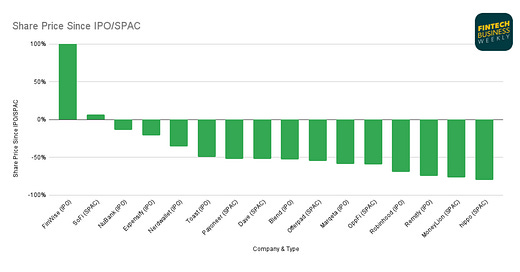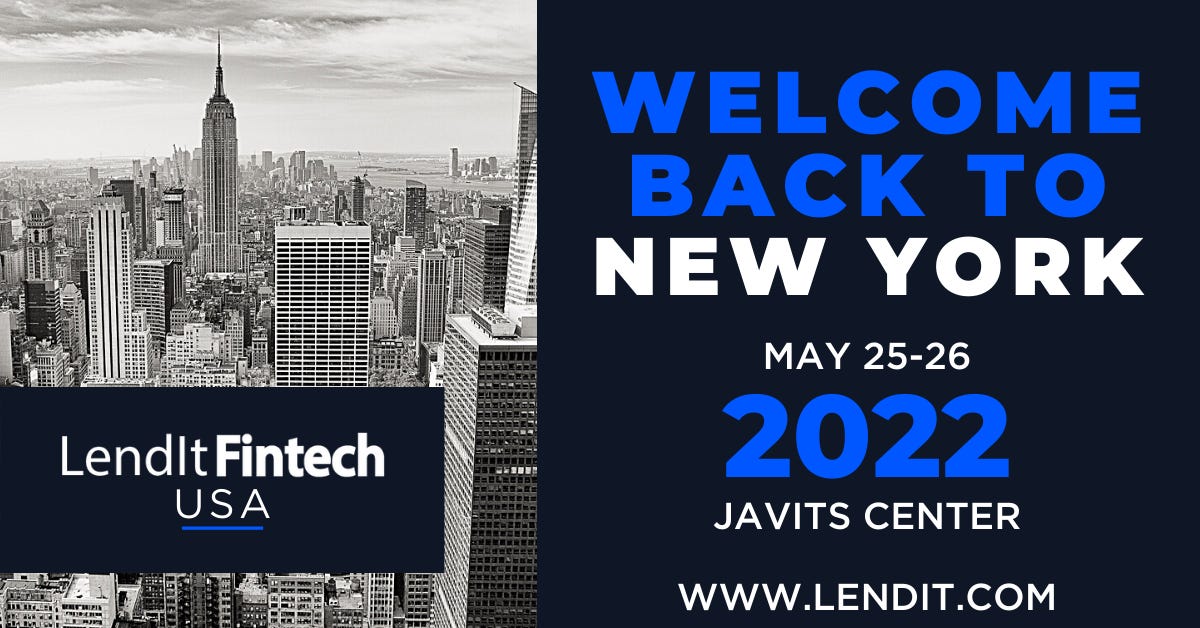TransUnion to Add BNPL to Reports (sort of); Citi Ends Overdraft Fees
Goldman Seeks to Punish Walmart Defectors, Chime's IPO Plans Delayed
Hey all, Jason here.
Frequent readers of this newsletter are likely aware that I pledged to donate 15% of subscription revenue to financial health causes — and, I’m proud to say, thanks to the generous folks who subscribe to this newsletter, I was able to donate $1,000 to the Financial Health Network this morning!
While the intention is to support financial health-related nonprofits, given Russia’s horrific invasion of Ukraine, I’ve decided to support the UN’s Ukraine Humanitarian Fund for my next donation. With the war still unfolding as I write this, the humanitarian catastrophe is only beginning.
Existing subscriber? Please consider supporting this newsletter by upgrading to a paid subscription. New here? Subscribe to get Fintech Business Weekly each Sunday:
New York City’s Largest Fintech Event Returns This Spring
Sponsored content: On May 25th - 26th, LendIt Fintech USA returns to the Javits Center for 2 days of world-class content and long awaited face-to-face networking. Explore the complexities of today’s financial services industry through insightful sessions focused on the most important trends in banking and lending. Key topics include digital banking, Web3, green fintech, consumer lending, embedded finance and much more.
Save 15% on your pass with the code MEDIA15_FBW — see you there!
TransUnion Will Add Support for BNPL Tradelines
Following in the footsteps of Equifax and Experian, TransUnion has announced plans to support the furnishing of BNPL tradelines.
Equifax was the first major bureau to announce support for BNPL furnishing, which it will incorporate in its existing credit reports with a new business industry code. Equifax is slated to implement the new coding by the end of this quarter. According to Equifax:
“The new industry code will classify BNPL tradelines, including payment history and give Equifax customers and scoring partners the ability to view and decide how to incorporate the information into their decisioning to potentially open up new mainstream financial services opportunities to more consumers.”
Equifax claimed in its announcement that the inclusion of BNPL tradelines would be beneficial for most consumers who pay on time, with an average 13 point increase in FICO scores.
Experian has taken a different approach and is planning to launch a separate “specialty” bureau for BNPL data. Experian has taken this route because, it argues, the inclusion of BNPL data on consumers’ primary credit reports could hurt their scores. In a statement announcing its Buy Now Pay Later Bureau, Experian stated:
“[T]he majority of BNPL accounts are not reported to credit bureaus because today’s most used score models are designed to predict risk based on payment behaviors of mainstream credit products, not BNPL accounts. In fact, reflecting BNPL information on credit reports as traditional loans or lines of credit can create negative impacts to consumer credit scores, even when BNPL products are used responsibly. This has, justifiably, prevented many BNPL providers from reporting BNPL payment information.”
TransUnion’s Approach to Adding BNPL
TransUnion’s approach is closer to Equifax’s than Experian’s. TransUnion will support reporting into consumers’ main credit files but BNPL data will be “tagged” and “partitioned.” According to TransUnion (emphasis added):
“TransUnion is launching the capability to receive point-of-sale lender trades through the traditional credit reporting process, with specific Metro 2® reporting guidance that ensures FCRA compliance. The goal is to have a single standard for lenders to report data and accelerate adoption by lenders and scoring providers in the future. The information will be tagged and filtered into a new partitioned part of TransUnion’s core credit file.”
TransUnion’s logic for segmenting the tradelines is consistent with Experian’s logic for setting up a separate bureau (emphasis added):
“Point-of-sale loans are transactional, like a credit card swipe, but they are underwritten as individual unsecured installment loans. Therefore, a consumer with normal shopping habits could originate several loans per year, which most existing credit models view as risky behavior. This could cause undue impact to millions of consumers’ credit scores, making scores less predictive.”
Companies ingesting TransUnion data will have to opt-in to receive the BNPL-specific tradeline data, leaving existing underwriting workflows and models unaffected. TransUnion argues this will give scoring partners (eg, FICO and Vantage) and companies that use its consumer reports time to understand the impact of BNPL data repayment data. Again from Transunion’s announcement (emphasis added):
“Users of TransUnion credit data will be able to opt-in to receive these tradelines as part of their existing credit data delivery. Default credit report delivery, which feeds existing scoring models, will remain unaffected.
Over time, as the industry works to enhance models with these data, it is expected that many lenders will choose to use the information in addition to their existing models to help expand their buy boxes – accelerating the consumer impact.”
Citi Largest Bank Yet to End Overdraft Fees
Citi made news last week as the first US mega bank to completely do away with overdraft fees. The bank announced its plans to eliminate overdraft fees, returned item fees, and “overdraft protection” fees entirely by this summer. At present, Citi charges $34 per overdraft/NSF, up to a max of $136 per day, and $10 for preventing an overdraft by drawing funds from a linked account or line of credit.
The move is notable due to Citi’s size — it is the fourth largest US bank by assets. However, Citi’s retail footprint is considerably smaller than the top three banks: JPMorgan Chase, Bank of America, and Wells Fargo.
According to the CFPB’s recent analysis of overdraft policies, Citi brought in just $70 million in overdraft/NSF revenue in the first nine months of 2021 — compared to $1 billion for Wells Fargo, $924 million for JPMC, and $823 million for Bank of America.

Measured as a percent of fee revenue, Citi is also less dependent on overdrafts than its more retail-focused peers. Citi derived just 1% of total fee income from overdrafts, vs. 2.3% at JPMC and about 5% at Wells Fargo and Bank of America, according to American Banker.
While those three banks have already made tweaks to their overdraft/NSF policies, as seen above, the changes are relatively minor, compared to Citi’s.
Given that they’ve already made changes to their fee policies, it seems unlikely that Wells, JPMC, and BAML would revisit them so soon, let alone eliminate overdraft fees altogether.
Still, Citi’s decision ups the pressure on its fellow mega banks, and is likely to renew calls from advocates and regulators for banks large and small to continue the roll backs. Even if the largest retail banks stand firm, the competitive landscape is rapidly shifting.
It’s difficult to imagine the small proportion of lower income consumers who disproportionately bear the brunt of these fees continuing to bank at Wells, JPMC, and BAML, when an increasing number of alternatives — “neobank” and establishment alike — offer products that better meet their needs.
Chime’s IPO Plans: Delayed
Chime was supposed to go public next month at a valuation of $35 to $45 billion, according to reports from Forbes last fall. Now, it looks like those plans have been derailed amidst broader tech market turmoil and poor performances from recently SPAC’d and IPO’d fintechs.
According to Forbes’ reporting, Chime made the decision to push back its IPO before recent market declines in order to focus on rolling out new products and features:
“Chime has pushed back its IPO time line because it’s focusing on releasing new products, which could include lending or investing features, the person says. Its target valuation hasn’t changed.”
Regardless of the reasoning behind Chime’s delay, it certainly feels like the fintech IPO window has closed.
And while additional time may give Chime a chance to build out new products, like lending or investing, it is unclear how impactful such products would be to the company’s bottom line. Chime’s user base is overwhelming low income and, presumably, skews lower credit score. Chime has reportedly struggled to manage fraud in its existing products.

These characteristics don’t exactly set Chime up for success with an investing product, given its customers have little money to invest, nor with a lending product, where the risks of Chime’s losses could increase dramatically.
Time may not be an advantage, when it comes to maximizing returns for its investors and current shareholders. More time means more data.
Selling a narrative of continued explosive growth is easier when extrapolating from a couple of years of rapid growth — which the pandemic and stimulus measures helped provide. By the time the IPO window reopens, Chime’s narrative may not be nearly as promising.
The Fintech Guide to World-Class Recovery
Sponsored content: The goal of a collections and recovery operation is to maximize profitability by efficiently recovering money lent to consumers while maintaining consumer loyalty — a tall order for fintech businesses trying to do it all in-house. But there is a win-win strategy out there, and you’ll find it in TrueAccord’s latest ebook, the Fintech Guide to World-Class Recovery.
The recovery and collection process is an opportunity for fintechs to extend the forward-thinking, consumer-centric approach that has made them successful in disrupting the status quo. This ebook provides the tools and frameworks to ensure that you’re architecting the right recovery strategy for your company for the long run.
Other Good Reads
Swift Sanctions (Net Interest)
Can Your Brand Become the Nike of Banking? (The Financial Brand)
Embedded Finance is Fueling a $25 Billion Banking-as-a-Service Opportunity (Ron Shevlin/Forbes)
Contact Fintech Business Weekly
Looking to work with me in any of the following areas?
Sponsoring this newsletter
Content collaboration or guest posting
News tip or story suggestion
Early stage startup looking to raise equity or debt capital
Feel free to reach out to me: jason@fintechbusinessweekly.com
Looking for Goldman Seeks to Punish Walmart Defectors?
There’s more Fintech Business Weekly below for paying subscribers👇 — if you already subscribe, thank you for helping make this newsletter possible







